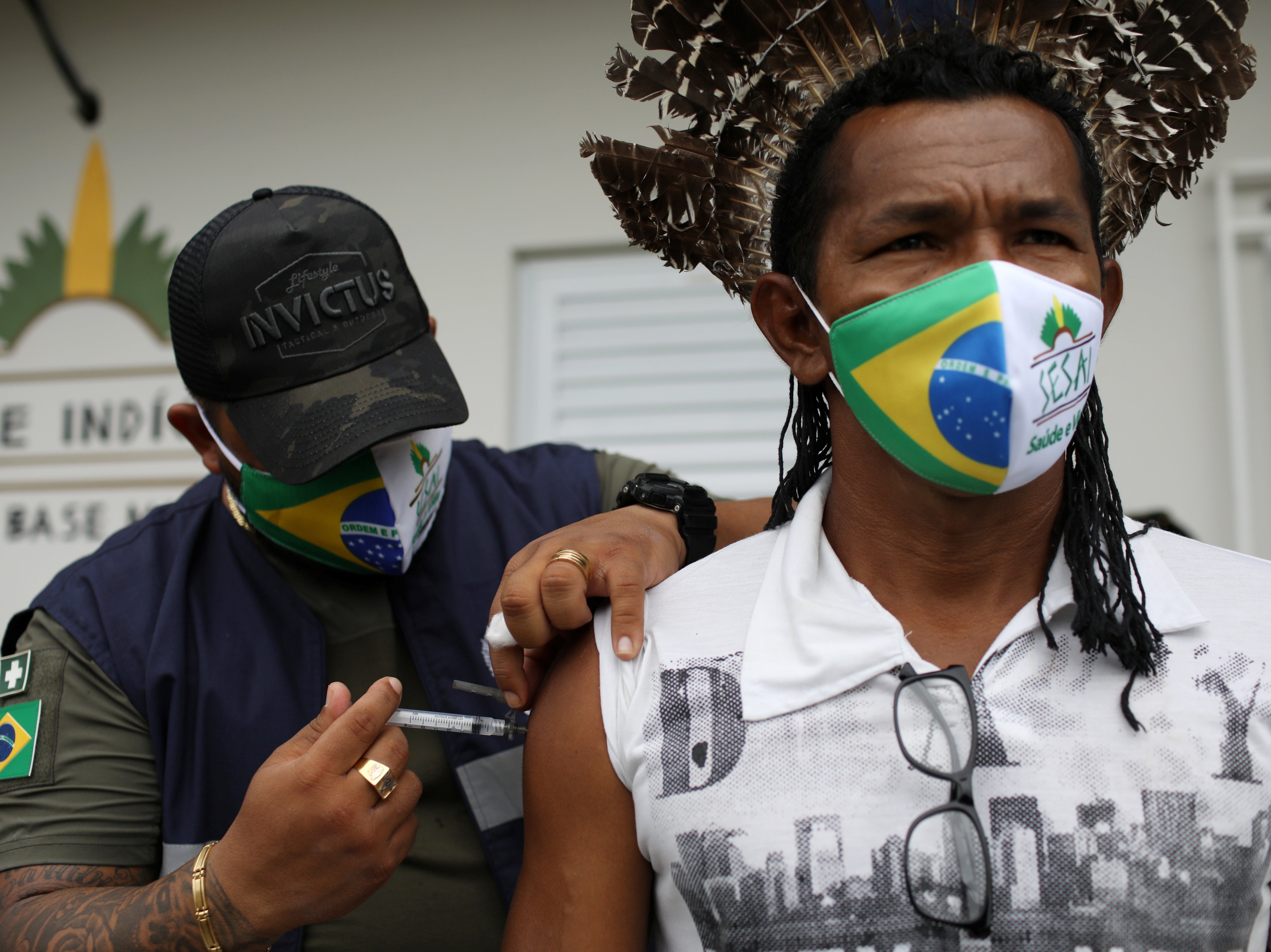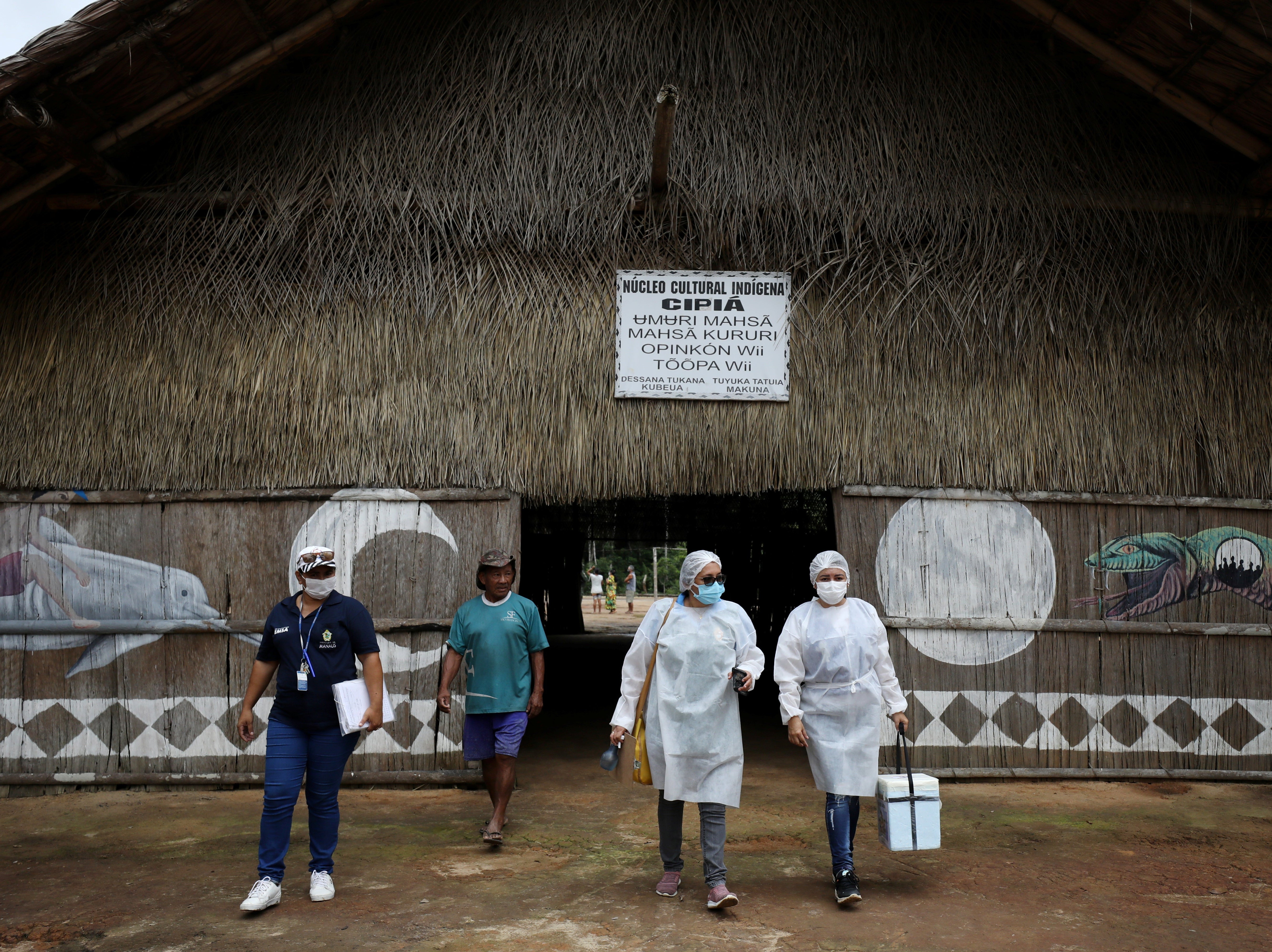Bows and arrows greet healthcare workers delivering Covid vaccine in Amazon
Vaccine misinformation spread among Brazil’s indigenous communities through chat apps such as WhatsApp

Your support helps us to tell the story
From reproductive rights to climate change to Big Tech, The Independent is on the ground when the story is developing. Whether it's investigating the financials of Elon Musk's pro-Trump PAC or producing our latest documentary, 'The A Word', which shines a light on the American women fighting for reproductive rights, we know how important it is to parse out the facts from the messaging.
At such a critical moment in US history, we need reporters on the ground. Your donation allows us to keep sending journalists to speak to both sides of the story.
The Independent is trusted by Americans across the entire political spectrum. And unlike many other quality news outlets, we choose not to lock Americans out of our reporting and analysis with paywalls. We believe quality journalism should be available to everyone, paid for by those who can afford it.
Your support makes all the difference.Healthcare workers have reportedly been confronted by crowds armed with bows and arrows while attempting to deliver the Covid-19 vaccine to indigenous communities in Brazil’s Amazon.
A team of health workers were airlifted into the heart of the Amazon rainforest to give the Covid vaccine to a group of indigenous people known as the Jamamadi.
But when they arrived, they were faced with fierce opposition from villagers and forced to leave without giving a single vaccine dose.
Healthcare workers have told BBC World Service’s The Anti-Vax Files podcast it is becoming common to go to a village with vaccine doses, only to have people reject them – something they say is unprecedented.
They then spend days negotiating and convincing people the jabs are safe, before going back with the vaccines once again.
In this case, the healthcare workers returned and managed to vaccinate some of the community after a chief of one of the villages changed his mind, according to BBC News Brasil.
However the majority of the tribe have still not accepted the inoculation.
A wave of vaccine misinformation spread through chat apps like WhatsApp is thought to be to blame for people’s opposition to the jab.
According to the findings of the BBC investigation, which can be heard in English for the first time on the BBC Trending podcast, mobile phone operators in Brazil often include free data in their user plans, but it is limited to select social media platforms, such as WhatsApp.
These plans, popular in indigenous communities, allow Brazilians to spend hours online for free – but limit access to other apps and alternative sources of online information.
If users want to use other apps or visit websites on the internet, they have to pay for data, making them less likely to seek out other sources of information to verify claims or stories seen on the chat apps.
This has helped fuel a wave of vaccine misinformation in these isolated communities.

Anapuaka Tupinamba, an indigenous journalist, told BBC Trending: “What we have today is a fake internet. So when you have fake news you have no way of checking.
“Without data you will not be able to access any other type of platform. It gives that feeling of “I’m on the internet” but not really.”
WhatsApp, which is owned by Facebook, says it is not responsible for the misinformation on its platform. Since it is encrypted, it says it doesn’t have access to the content being shared.
The company says it has also taken measures to stop false reports, including launching free services on Covid-19 with the World Health Organisation and news verification agencies.
The BBC investigation found it is not only bad information in chat apps that is contributing to vaccine hesitancy in the Amazon.
Miguel Aparicio, an anthropologist, told BBC Trending that some religious groups in the Amazon have also increased vaccine hesitancy.
The team also spoke to Indianara Machado, a nurse in Central-West Brazil, who described the difficulties she had in her family after one of her relatives saw videos of president Jair Bolsonaro denouncing the vaccine.
In Brazil, the uptake of vaccines in indigenous communities is now significantly lower than had been expected.
BBC News Brasil used Brazil’s Access to Information law to obtain the immunisation rate of indigenous people for a number of different vaccines, finding a recent previous vaccine drive for the flu had a 90 per cent take-up rate over a one-month period.
Since Brazil’s Covid-19 vaccination programme started on 18 January, just 75 per cent of the indigenous population have had their first dose of the vaccine over a three-month period – a significant shortfall compared to the previous flu vaccine roll-out.
Brazil has the second-highest Covid death toll in the world, with 400,000 deaths recorded so far.




Join our commenting forum
Join thought-provoking conversations, follow other Independent readers and see their replies
Comments